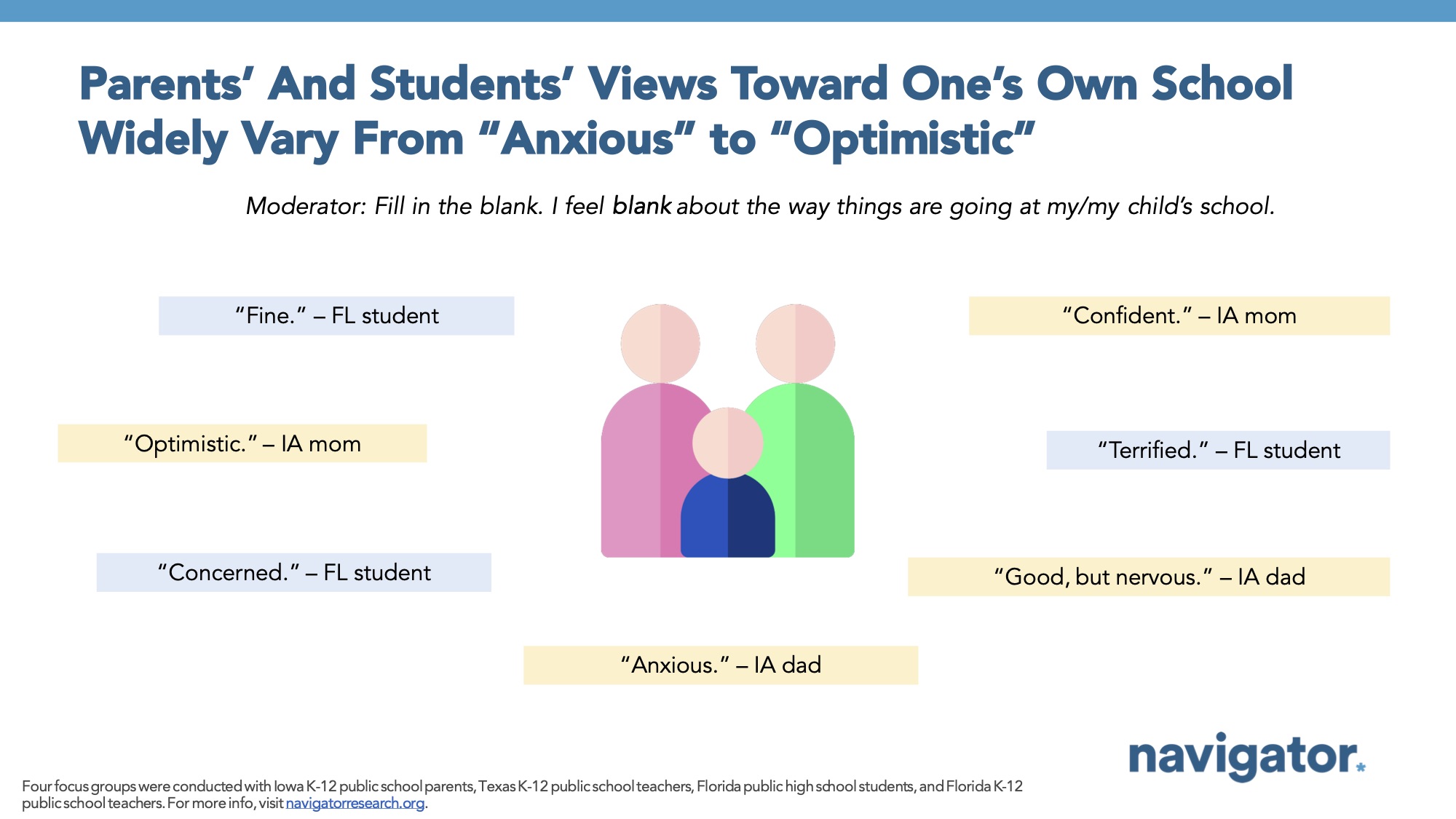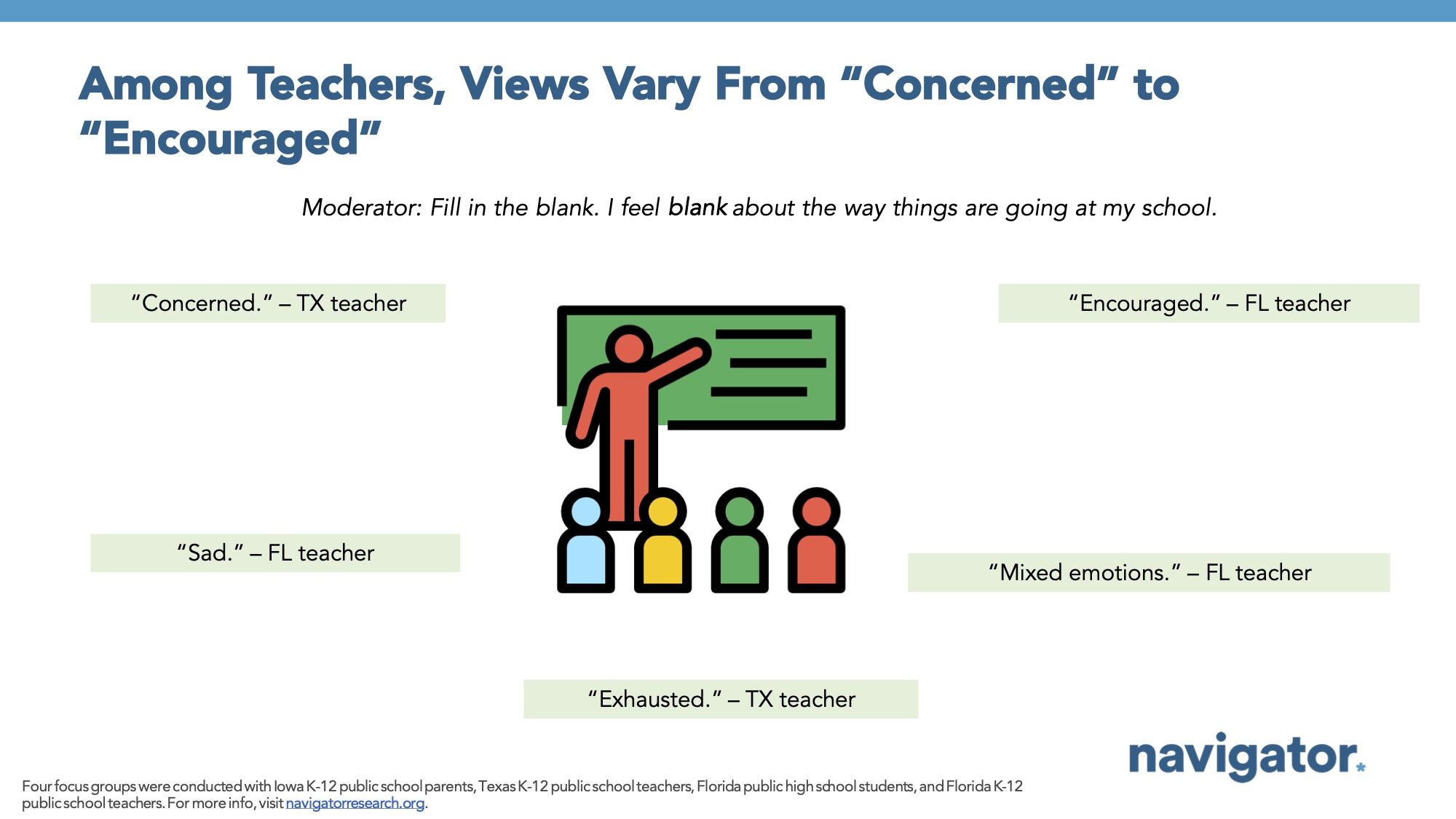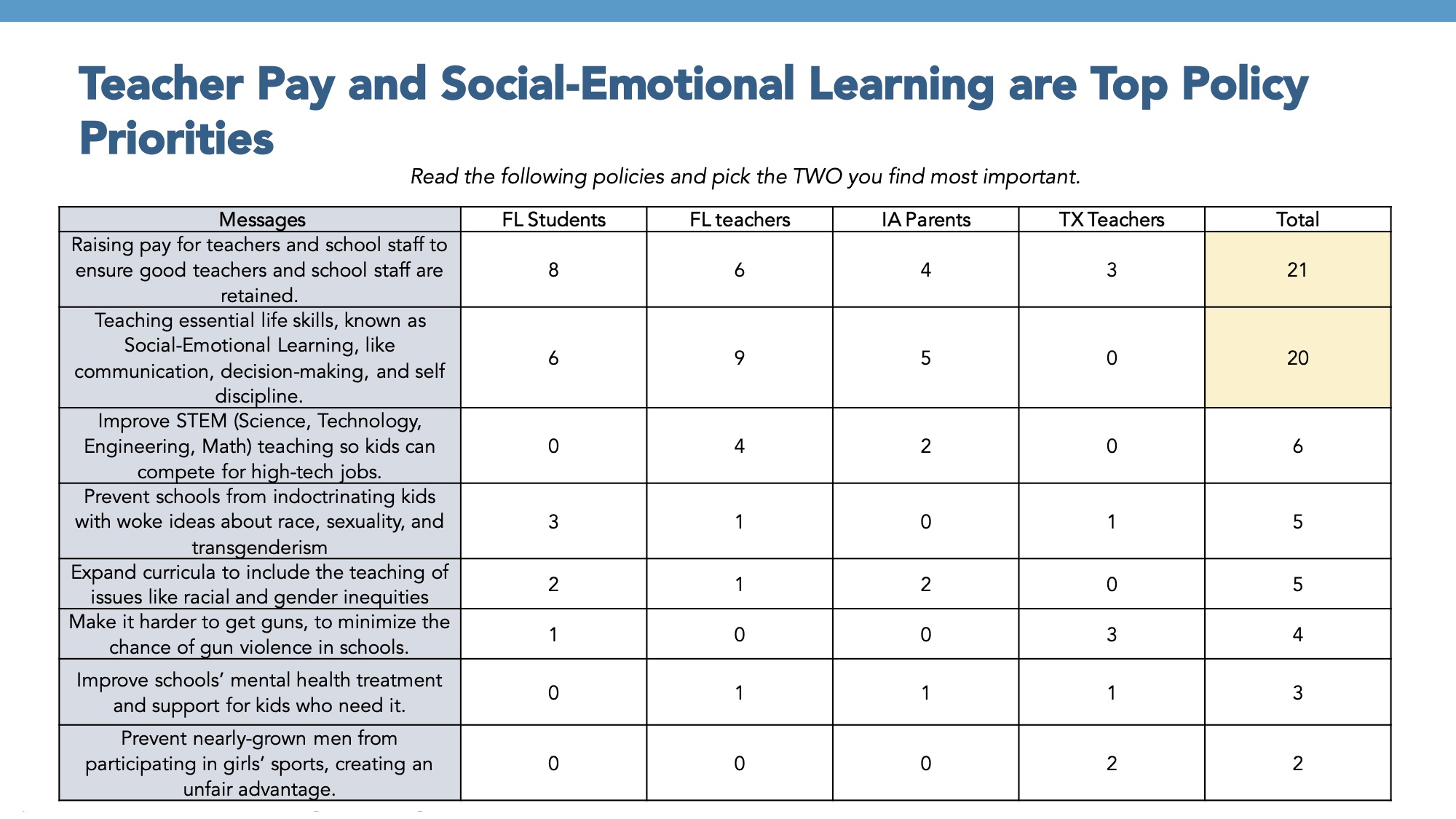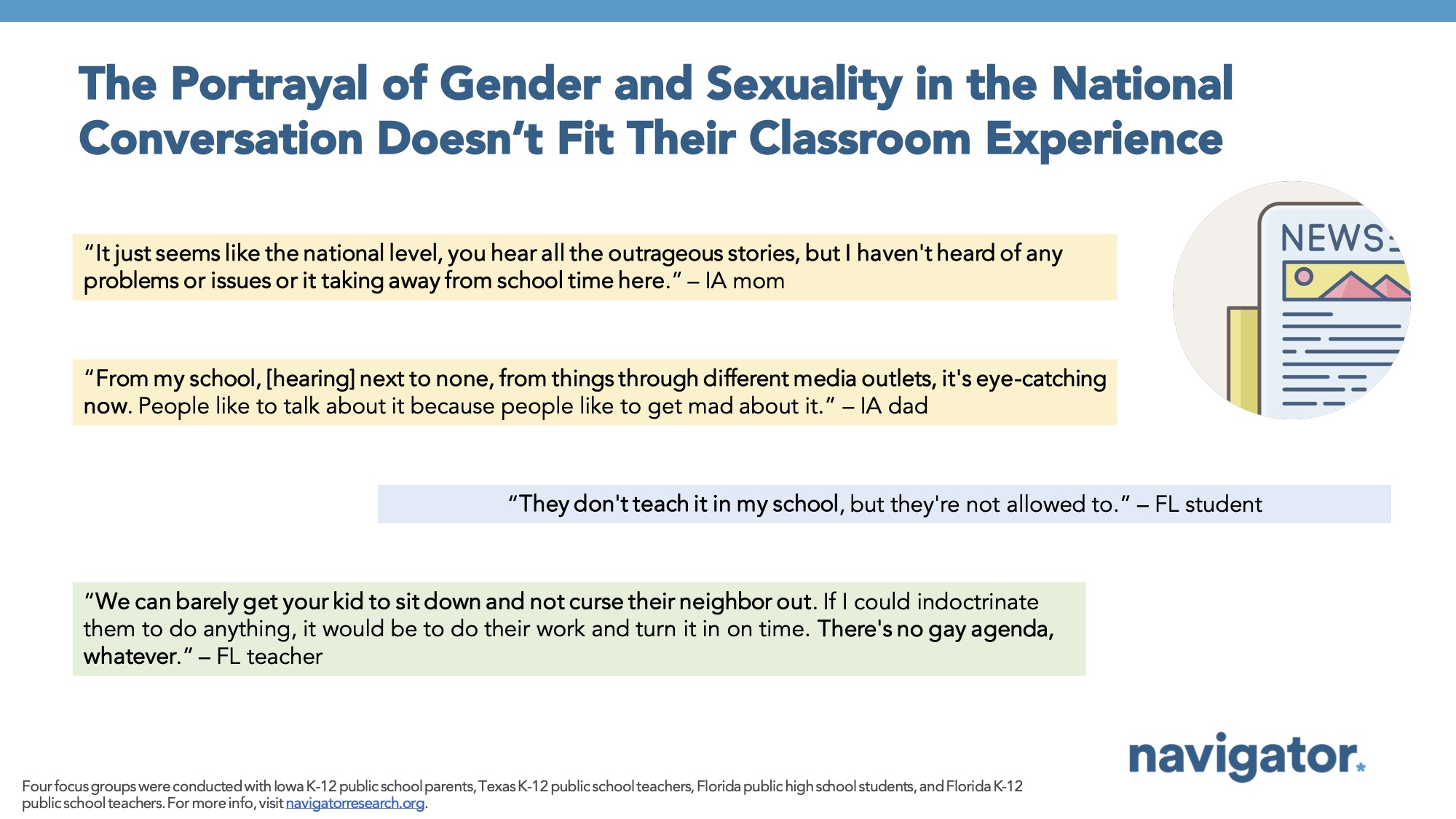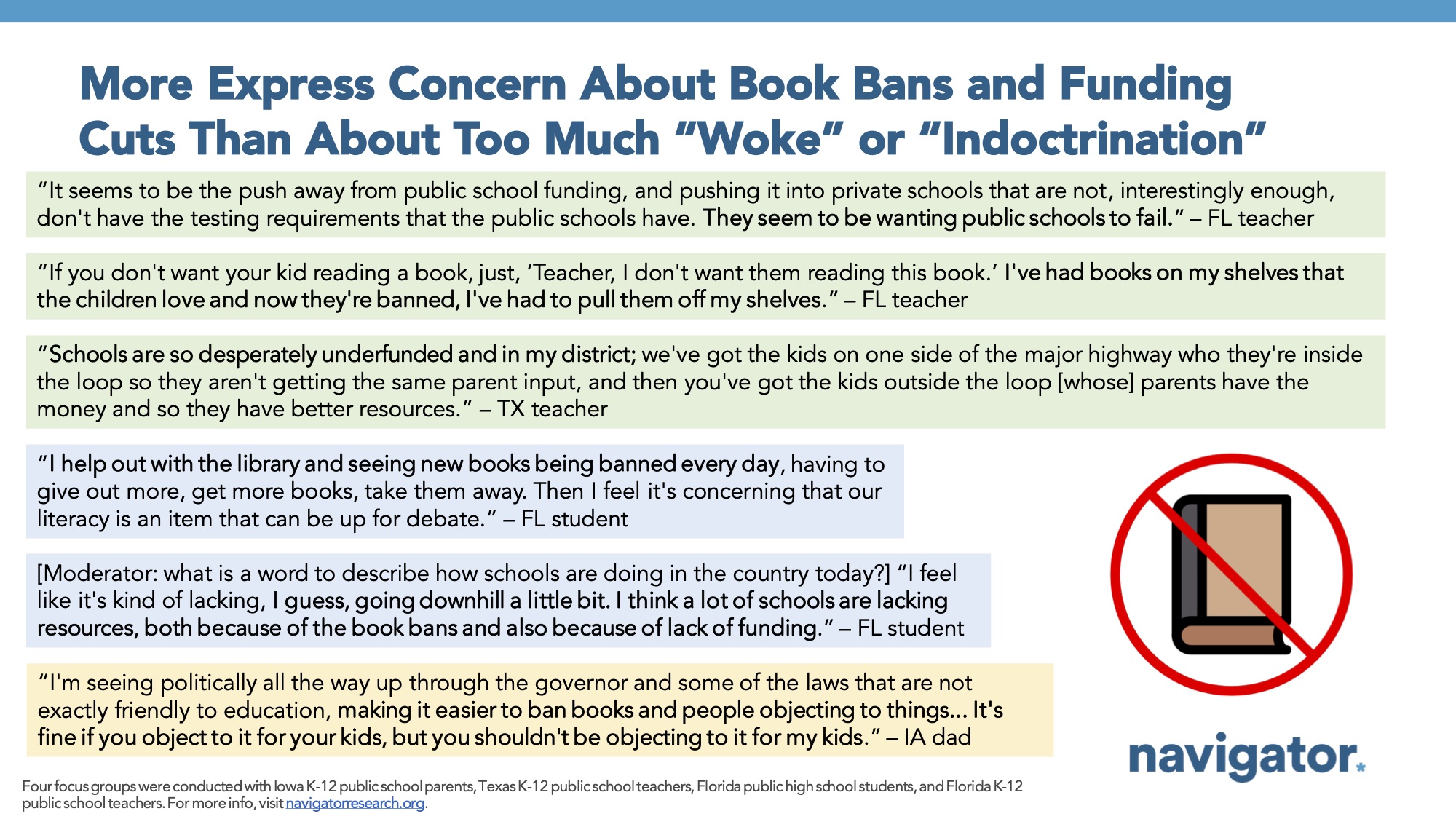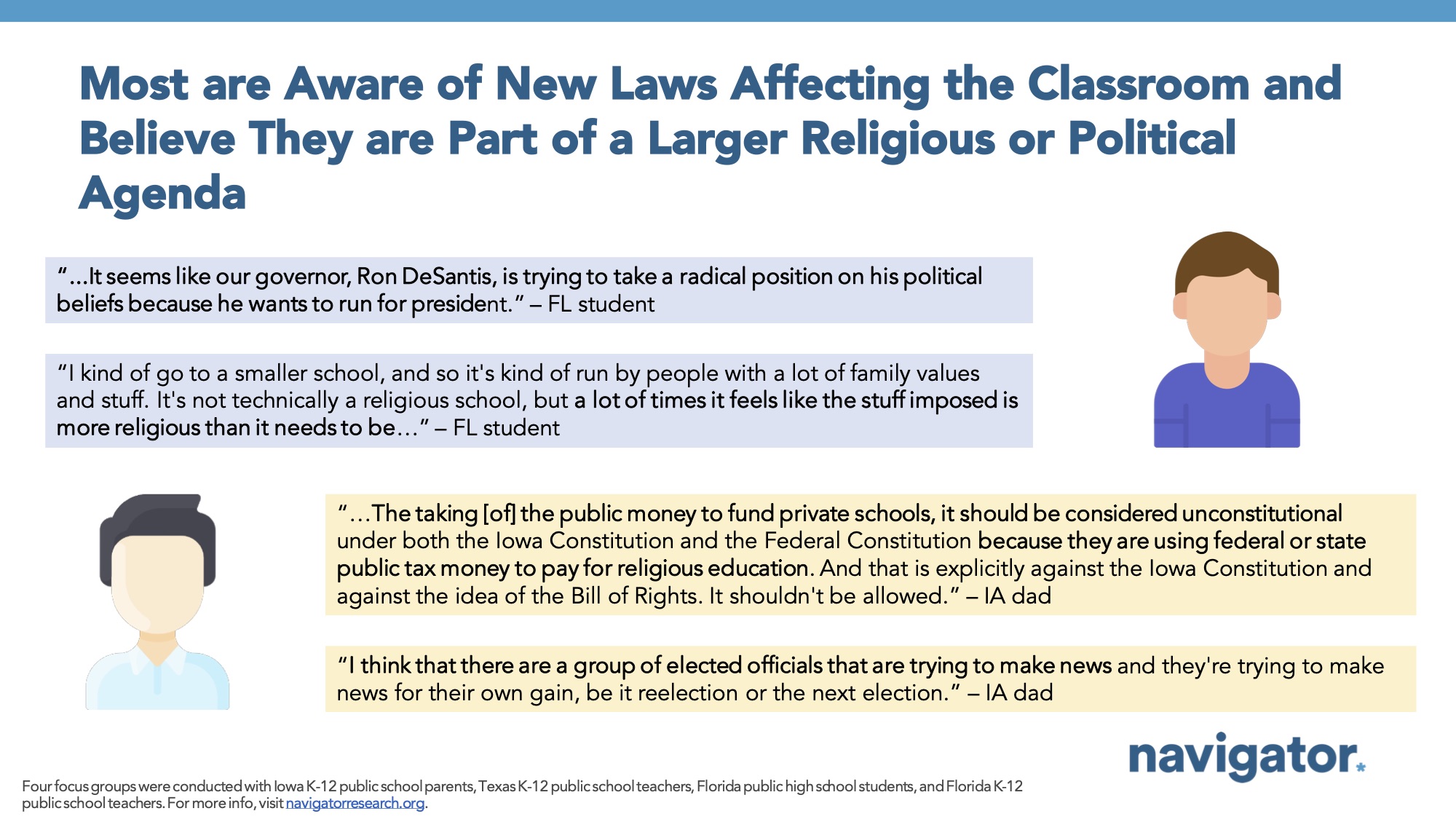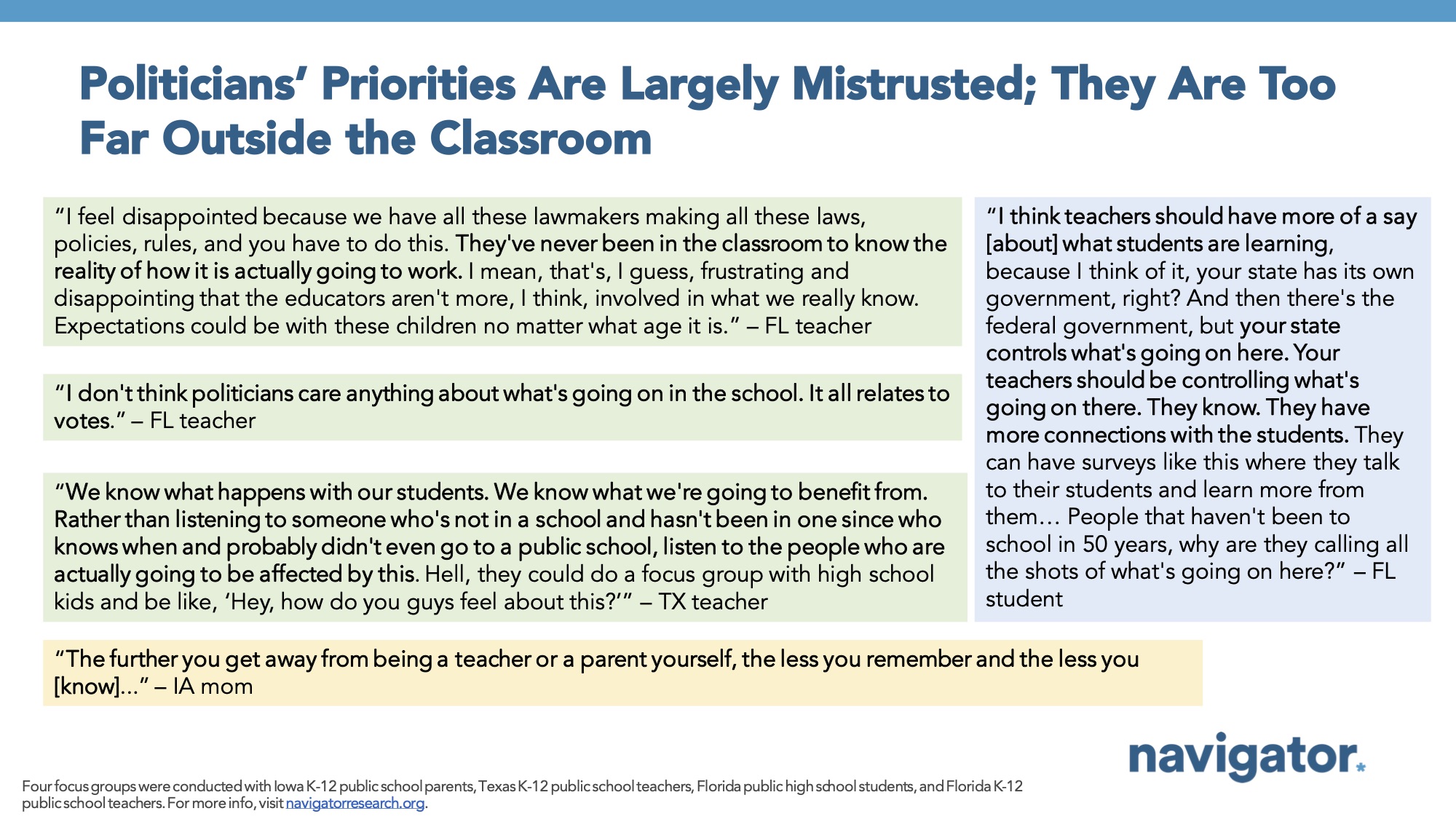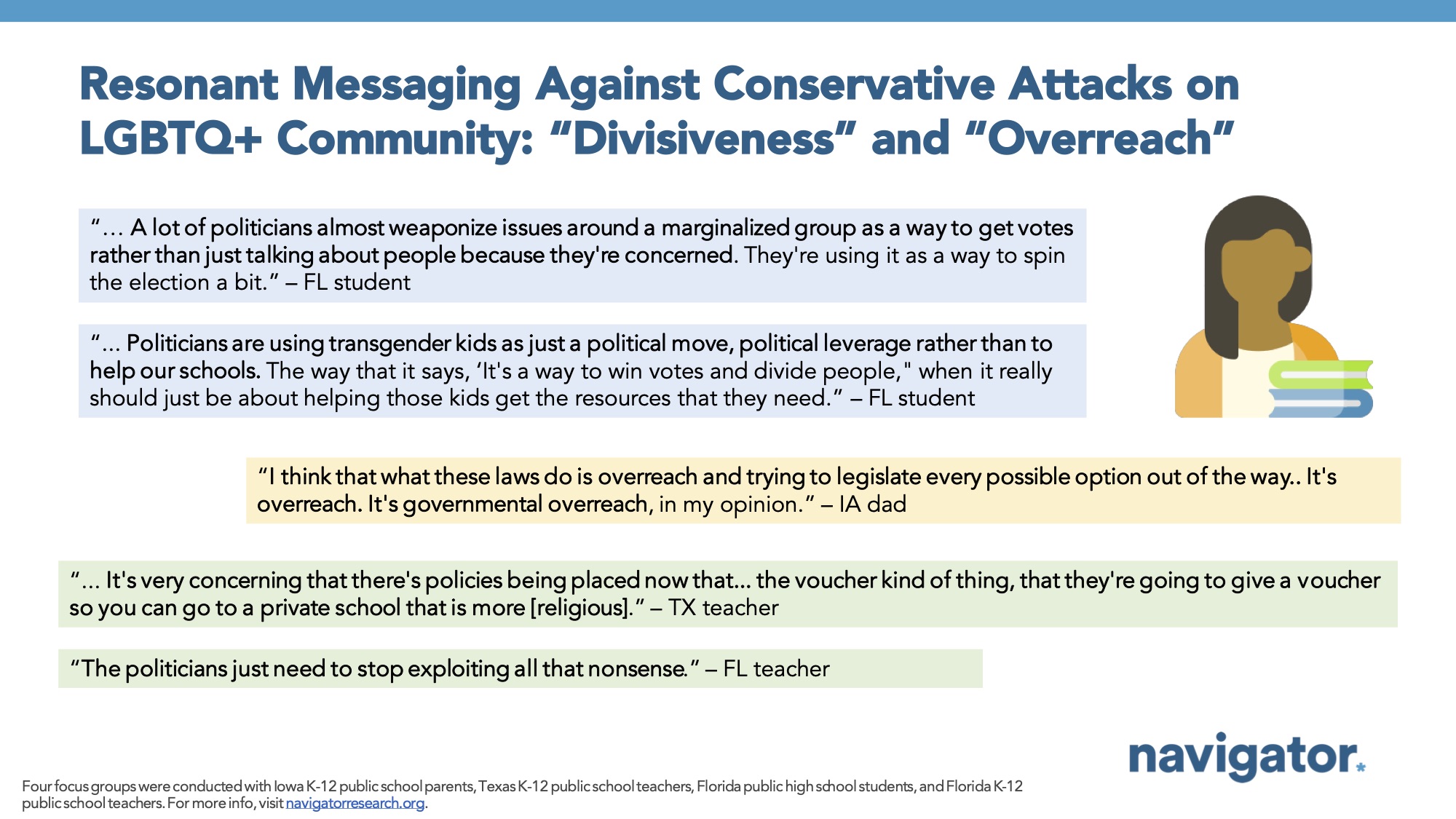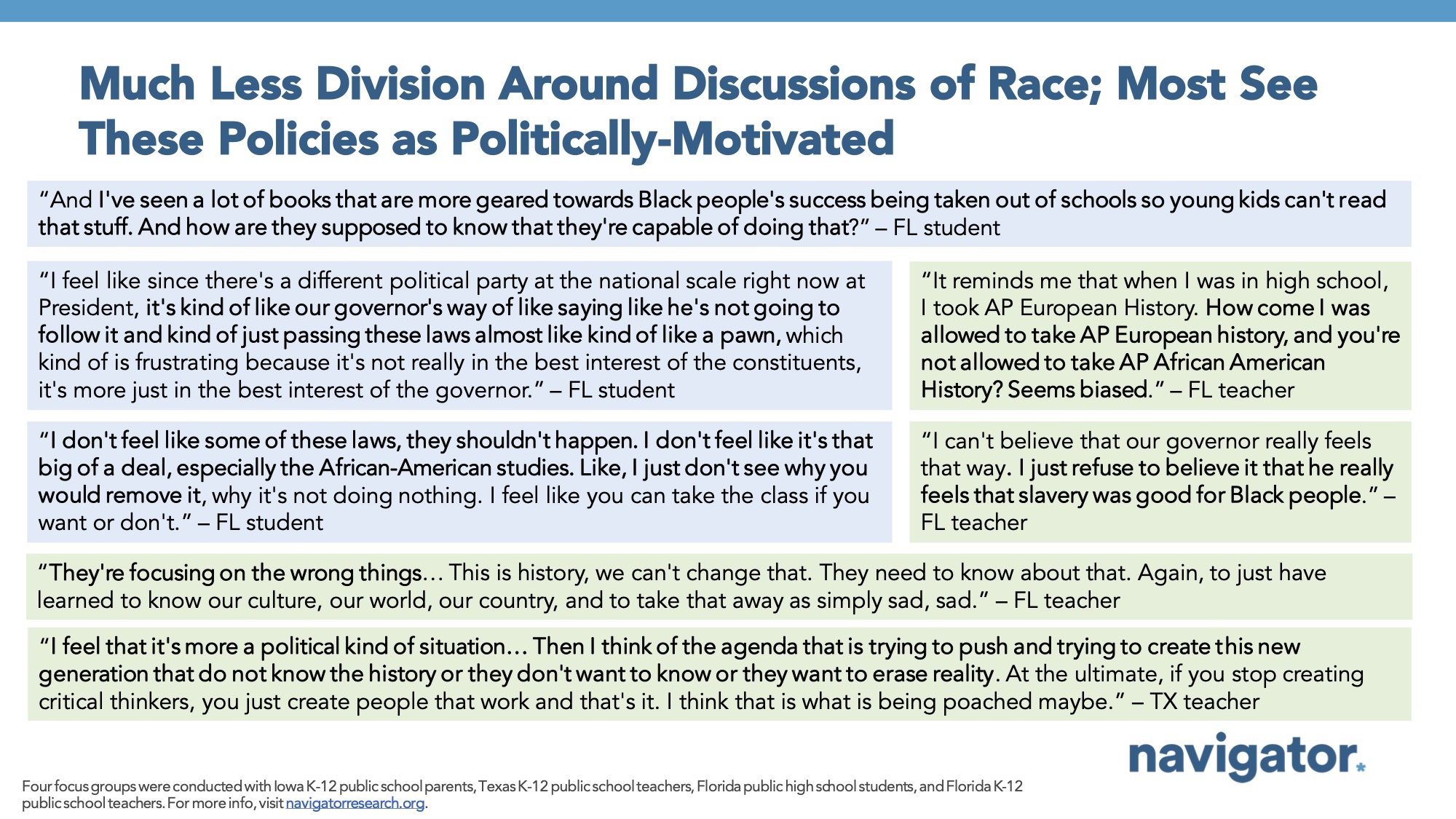Focus Groups: K-12 Parents, Students, and Teachers on the State of Education
This Navigator Research report contains findings from focus groups conducted on among parents of K-12 public school students in Iowa, public school educators in Texas, and both public school educators and high school students in Florida assessing how each is feeling about education policy and schools as students head back to the classroom this fall. These groups explored the top priorities participants have when it comes to education policy, how state policies are impacting their child’s or their own classroom, and whether topics like gender identity, sexual orientation, or race should be taught in schools.
As students return to school this fall, parents, educators, and students express varied emotions.
When asked how things are going in school, parents in Iowa expressed optimism mixed with some nerves about the new year, while high school students in Florida varied from “fine” to “horrible.” A high school student stated he was satisfied because “as much as my school does have some issues, I go to school to learn and make friends… I don’t think any of those issues are related to impeding on that kind of aspect of school.” At the national level, parents were more likely to say things were going less well, with one dad stating: “I think every year brings some nerves, but it was brought up by a few people… funding, school shootings, things that your kids are being taught that you’re not aware of.”
- Educators in Texas and Florida similarly expressed mixed emotions, with some citing disciplinary problems, pandemic learning gaps, and restrictions in the classroom. As one Florida educator stated: “I’m sad because discipline is the word I keep hearing and that’s my problem… I know every single name of bad kids.” Another Florida educator stated: “I teach third grade, and so [these are] our COVID babies… there is a huge, huge learning gap that we’re trying to bridge to meet the district and the state expectations… I have students that can’t read, and then I have students that can’t write letters… it’s overwhelming to try to meet their needs and the rigor of what the state’s asking.”
Supporting teachers, raising teacher pay, and teaching real-life skills are seen as important to making a school successful.
When asked what they thought makes a school successful, a dad in Iowa noted “my sophomore actually has the option to take [financial literacy classes]… this is how you pay bills, this is how you budget for rent, and if you buy a car, which is something I didn’t have at the same high school that he goes to now, so I’m happy to see that they’re going that direction with offering those classes.” In an August survey, “making sure they learn the things they need to know to be successful in school and life” was the second highest priority for Americans (55 percent) when it comes to America’s children, closely behind “keeping them safe from gun violence and mass shootings in schools and other public places” (58 percent). An Iowa dad also mentioned supporting educators: “I think it’s a lot to do with teachers, but I also think it’s the staff from the top down… I mean, you [have] got to have a good support structure for those teachers to be able to go out there and influence those kids and help them with their day-to-day struggles.” A high school student in Florida similarly noted teachers: “I think it’s a lot of factors… sometimes there’s a lot of teachers, you can tell [if] a teacher really likes to teach… otherwise, you’ve got to raise the pay.”
- Educators in Florida and Texas viewed a successful school as a more holistic outlook rather than just a focus on test scores. As a Florida teacher put it: “I think focusing on the whole child, not a test score, not a subject, but them as a person and how they react and deal with things.” While a Texas educator noted “the state could just support teachers more… most of the negative rhetoric that we’re getting about education and public education especially is coming from our elected leaders, then it trickles down to the voters who go to the school board meetings and say what they’re going to say and sway those decisions, and if they truly believe that education is important, then they need to show that they believe that by supporting education.”
The portrayal of gender and sexuality in the classroom in the national media doesn’t fit what these participants have experienced, but the legislative effects have had direct impacts on the classroom.
When asked what they have heard about the teaching of gender and race in schools, a dad in Iowa stated: “From my school next to none, from things through different media outlets, it’s eye-catching now… people like to talk about it because people like to get mad about it.” An Iowa mom similarly noted: “It just seems like the national level, you hear all the, like he says, outrageous stories, but I haven’t heard of any problems or issues or it taking away from school time here.” A student in Florida also stated that “they don’t teach it in my school, but they’re not allowed to” in relation to race and gender being taught in school. In an August poll, “preventing them from being exposed to woke ideas about race and gender in school” ranked among the lowest priorities for America’s children (28 percent), largely driven by Republicans (50 percent). However, the impact of the varied legislation is being felt by these participants: as one Florida teacher put it: “Nobody knows, the laws aren’t clearly enough defined that everyone’s walking on eggshells… I just am waiting for someone to tell me, ‘You’re fired because of this book on your shelf.’”
- Legislation related to nicknames was brought up several times, including an Iowa dad recalling his own experience: “You see laws passing that say you have to have parental permission to use a nickname for your kid in this state, and schools had to ask, ‘What are we allowed to call your child?’ That’s silly.” A Florida public school student remarked on her school policy: “At my school, if you want to be called something, you have to get a whole form signed and stuff, and I don’t really think that’s necessary… it’s illegal if the teacher calls you a name that you’re not.”
- While others expressed concern over courses being removed from schools as a result of laws, one Florida teacher noted: “We had AP Psychology taken away in our school, and we asked our students, that’s one of the best classes they’ve ever had.” A high school student in Florida similarly remarked: “AP Psych is no longer taught in school because it talks about gender and sex, and I think it’s really disheartening that students can’t have conversations like that with your AP Psych teacher who’s taught to be able to teach you stuff like that.”
- A primary concern in each group revolved around book bans affecting school libraries. One Florida teacher said: “I’ve had books on my shelves that the children love and now they’re banned, I’ve had to pull them off my shelves.” A Florida high school student also explained their experience with book bans: “I help out with the library and seeing new books being banned every day, having to give out more, get more books, take them away.” A Texas educator said: “we got a letter today from the executive director about the books with explicit content at the high school level.” In our August survey, 92 percent of Americns were concerned about policies banning books including books about Anne Frank and MLK.
Current legislation that impacts the classroom is not seen as addressing priorities in education, but rather as a part of a larger, political agenda.
In response to newly-enacted laws related to bathrooms and gender identity, an Iowa dad said: “It’s overreach… it’s governmental overreach, in my opinion.” Another Iowa dad noted the actual purpose of the bill “was an attack on transgender people.” When asked why these laws are enacted if they don’t address priorities, an Iowa dad said: “I think that there are a group of elected officials that are trying to make news and they’re trying to make news for their own gain, be it re-election or the next election.” A Florida high school student similarly noted: “In my opinion, it kind of shows that there’s a certain agenda and it’s more of the far right agenda rather than centrist or leftist.” Another student said: “It seems like our governor, Ron DeSantis, is trying to take a radical position on his political beliefs because he wants to run for president.”
- When it comes to who should decide what students need to know to succeed, educators, parents, and students don’t view politicians as the experts. When asked how schools should decide what kids need to know, an Iowa mom noted that “you hope that parents have a lot to say in that,” while an Iowa dad added “there has to be a real partnership with parents.” A Florida student put the onus on teachers: “Your teachers should be controlling what’s going on there…. they have more connections with the students.” A Texas educator stated: “What we need is those that are in education to actually speak on our behalf because a lot of times it is the politicians that are up there that believe that these things are important, but they don’t actually know what goes in the classroom.”
Classroom discussions related to race feel necessary when it comes to a historical context, while gender and sexual identity receive some pushback.
When shown a range of messages about race-based discussions in the classroom, a teacher in Texas noted: “looking at the history completely is also going to help to represent them in the classroom. Because if we… want them to be these informed individuals… they also need to understand why things are the way they are.” A Florida teacher agreed: “This is history, we can’t change that… they need to know about that…, to just have learned to know our culture, our world, our country, and to take that away as simply sad, sad.” A Florida student mentioned: “It’s so crucial that we learn from history and [that] we learn from our mistakes in the past and [that] we improve [in] the future.” Another student remarked that “African-American history is American history, and that if politicians take away those books and those opportunities for us to learn, then we are not learning American history.”
- On gender and sexual identity, an Iowa mom said: “I think that children should not have a sexual identity because children are not having sex… I don’t know why we talk about it at school.” An Iowa dad felt the topic might be more appropriate for high schoolers: “I think you hit a certain point where you know maybe you’re a transgender and you feel like a girl trapped in a boy’s body or vice versa… by the time high school hits, that may legitimately be true or definitely into college, but I think you get below high school, in middle school, my son is still figuring himself out…” Students expressed different concerns, with one Florida high school student stating: “It’s putting trans kids in danger with the new laws that are coming… ‘s just having this whole cloud of hate and discrimination towards a marginalized group.”
Educators and students say that if given the opportunity, they would show their governors their diverse student bodies, school safety lockdowns, and a thinned-out library.
When asked what they would show their governor in their school if given the opportunity, a student in Florida noted about her school library: “I’d like to have him go into my school’s library and just see how many shelves are empty and how many books are missing now because my school just got our library started up [and] it took students the whole summer to get it organized and then they passed this, and now they’ve had to go through every single book and look for what they have to look out for and remove those books… it’s just really sad to see some of the empty shelves.”
- A Florida teacher said she would show “an actual lockdown with my son in the classroom standing at the door with scissors, and ready to fight for my child and my students was a harsh reality.” Other participants said they would showcase the diversity of their school, including a Texas teacher who said: “I would show him the diversity of our school that there’s everything and nothing seems different… ‘and we all get along,’ and that’s the beauty of it… not until politicians come and not until we start talking about racism or how we should be or who’s not this, that, what’s in, what’s out, doesn’t matter.”

